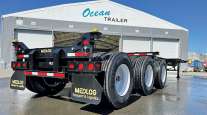Senior Reporter
Federal Maritime Commission Sides With IMCC on Dispute

[Stay on top of transportation news: Get TTNews in your inbox.]
The Federal Maritime Commission, by a 4-1 vote, upheld a previous decision that ocean carriers violated federal law when a judge ruled the carriers required trucking companies to use specific intermodal chassis providers when moving containers in and out of ports and transporting them on trucks or via freight rail to their destination.
Last March, FMC Chief Administrative Law Judge Erin Wirth ruled in favor of American Trucking Associations’ Intermodal Motor Carriers Conference, which charged in its initial filing in 2020 that the Ocean Carrier Equipment Management Association and 11 international ocean carriers violated the Shipping Act of 1984 by inflating prices for intermodal chassis at dozens of ports nationwide.
FMC’s final ruling was announced Feb. 14. As expected a year ago, OCEMA appealed the judge’s ruling and asked the five members of FMC to hear the case.
“The commission finds that respondents’ rules and practices designating an exclusive chassis provider for merchant haulage and using merchant haulage volume to lower their carrier haulage rates when motor carriers have no choice of providers are unreasonable,” FMC Chairman Daniel Maffei wrote. He was joined by commissioners Rebecca Dye, Louis Sola and Carl Bentzel. Commissioner Max Vekich cast the dissenting vote.

Maffei
“Respondents are ordered to cease and desist from the restrictive practices found to be unlawful under Section 41102(c) in the four regions covered by this administrative law judge’s initial decision: Los Angeles/Long Beach, Chicago, Savannah and Memphis. This case is remanded to the ALJ [administrative law judge] to resolve the remaining claims.”
Section 41102(c) is a part of the federal code that shipping companies are regulated under and must comply with as part of the FMC oversight mandate.
“Complainant makes a compelling case supported by its experts’ analysis that the challenged practices impose unfair restrictions on competition and raise merchant haulage prices,” the four commissioners added. “Respondents have not refuted complainant’s evidence with facts, data or well-supported analysis.”

Eisen
IMCC Executive Director Jonathan Eisen said in a statement: “The FMC has now confirmed that the actions of these ocean carriers are a clear violation of federal law and must stop. IMCC and ATA have been fighting this conduct by foreign-owned ocean carriers for more than a decade, so this ruling has been a long time coming.”
Ocean shipping companies historically have controlled the chassis-leasing business at most major ports under the Uniform Intermodal Interchange and Facilities Access Agreement, which a 10-member group of industry representatives administers. At these ports, trucking companies are directed toward chassis available for rent and the rates being charged.
In her initial ruling a year ago, Wirth did not grant any financial award in her decision.
“There is not sufficient evidence in the record to award reparations at this stage of the proceeding,” she wrote.

Wirth
In addition to the price of chassis, trucking companies have long complained about the physical quality of chassis at ports, especially related to tires, brakes and lighting. Some distributors have upgraded their equipment by replacing older chassis or refurbishing them and adding radial tires, disc brakes and LED lighting. Several new manufacturers have entered the market in the past several years, and other existing chassis companies have expanded production in the U.S.
For years, ocean carriers owned and leased chassis and other intermodal equipment to trucking companies that drivers use to move containers from ports to inland locations. About 10 years ago, ocean carriers began working with third-party leasing companies to reduce their cost of managing and owning containers.
“With details to be finalized by the ALJ, hardworking American trucking companies will now be able to choose their chassis providers rather than being taken advantage of by a cartel of overseas shipping lines,” Eisen said. “By affirming motor carriers’ right to chassis choice, the FMC has taken action to reduce supply chain delays and cut costs for motor carriers and consumers.”
In the four locations cited in the FMC ruling, the combined ports of Los Angeles and Long Beach complex moves an estimated 20 million 20-foot-equivalent containers annually, and many are on chassis.
In recent years, the Port of Savannah, Ga., has embarked on a $1 billion-plus program to nearly double its capacity to more than 5 million containers a year. It is now the second-busiest port on the East Coast, trailing the Port of New York and New Jersey. Chicago has been a major rail-intermodal and trucking center for more than 100 years, and Memphis, Tenn., is the corporate headquarters of FedEx Corp. During overnight hours, Memphis International Airport is the world’s second-busiest cargo airport and the busiest in North America. It moves millions of pounds of cargo each night, much of it brought to the airport via trucks on chassis.
Want more news? Listen to today's daily briefing below or go here for more info:




